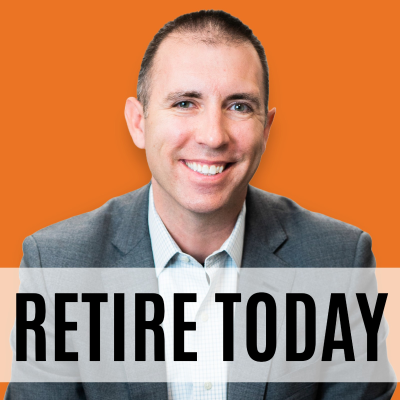
Retire Today
Englisch
Gratis en Podimo
Kostenlos hören bei Podimo
Starte jetzt und verbinde dich mit deinen Lieblingspodcaster*innen
- Vertraut von über 1 Mio. deutschen Hörer*innen
- Über 1.000 lokale Podcasts und Shows – nur bei Podimo
- Keine Zahlung nötig
Mehr Retire Today
In the Retire Today podcast, Jeremy Keil, CFP®, CFA® shows you how to turn your retirement savings into retirement income. Listen in as Jeremy and his guests guide you towards making smarter retirement, investment, and tax planning decisions. Get free resources and learn how to have Jeremy and his team develop your own Retire Today income plan at 5stepRetirementPlan.com. For important disclosures, see www.keilfp.com/disclosures Keil Financial Partners may utilize third-party websites, including social media websites, blogs, and other interactive content. We consider all interactions with clients, prospective clients, and the general public on these sites to be advertisements under the securities regulations. As such, we generally retain copies of information that we or third parties may contribute to such sites. This information is subject to review and inspection by
Alle Folgen
270 Folgen7 Year-End Money Moves Before December 31
Jeremy Keil explores 7 money moves you can consider before the new year to lower your taxes and keep more of your money in retirement. Every December, people scramble to finish holiday shopping, travel plans, and year-end tasks. But one of the most important deadlines — your December 31st tax deadline — often gets overlooked until it’s too late. And once the calendar flips to January 1st, many of the smartest tax moves disappear. In this episode of Retire Today, I walk through seven year-end tax steps you should consider to make sure April brings fewer surprises and more savings. With new tax laws taking effect, the stock market sitting near all-time highs, and contribution limits shifting in the coming years, this is the perfect moment to take control of your finances. ---------------------------------------- 1. MANAGE YOUR TAX BRACKET BEFORE THE YEAR ENDS Your income may fluctuate from year to year — especially in retirement. Some retirees have unusually high-income years due to bonuses, pension payouts, early retirement packages, stock vesting, or unexpected distributions. Others have abnormally low-income years. If you’re experiencing a higher income year, now is the time to pull deductions forward. Charitable giving, donor-advised fund contributions, and other deductible expenses can help lower your taxable income. If you’re in a lower income year, you might choose to accelerate income instead — such as doing a Roth conversion or taking extra withdrawals at a better tax rate. Year-end planning starts with projecting your tax return and understanding which direction to go. ---------------------------------------- 2. HARVEST CAPITAL LOSSES — AND SOMETIMES GAINS Even in years when the market is high overall, you may still have individual positions sitting at a loss. Harvesting those losses can offset gains or reduce taxes now or in the future. On the flip side, some retirees find themselves in the 0% long-term capital gains bracket, which creates the perfect opportunity to harvest capital gains on purpose. When you’re in a low tax bracket and gains cost nothing, you can reset your cost basis without additional tax. This is one of the most underused year-end strategies — especially when markets have been climbing. ---------------------------------------- 3. REVIEW MUTUAL FUND CAPITAL GAIN DISTRIBUTIONS Many mutual funds issue their capital gain distributions in December. You may not receive the money in cash, but it still counts as taxable income. Look up the estimated year-end distributions from your fund companies and double-check your brokerage account. Mutual fund distributions have surprised many retirees — and they can lead to unnecessary underpayment penalties if tax withholding isn’t adjusted in time. ---------------------------------------- 4. GET YOUR TAX WITHHOLDING CORRECT Years ago, tax underpayment penalties weren’t a big deal. But with high interest rates today, penalties now operate more like expensive interest charges for not paying taxes in the proper quarterly schedule. If you expect to owe money for 2025, you may want to adjust withholding from your paycheck, pension, Social Security, or IRA distributions. For retirees over 59½, using IRA withholding is one of the easiest ways to catch up — and it is treated as if it was paid evenly all year. To avoid penalties, don’t wait until spring. Make corrections before December 31st. ---------------------------------------- 5. USE QUALIFIED CHARITABLE DISTRIBUTIONS (QCDS) If you’re age 70½ or older, QCDs allow you to donate directly from your traditional IRA to charity tax-free. This is often better than taking withdrawals and giving afterward — especially if you use the standard deduction. Even if you’re not yet required to take RMDs, QCDs can reduce your future RMD burden and help you give in a more tax-efficient way. With 2025 bringing updated QCD limits and ongoing rule changes, it’s smart to review your giving strategy now. ---------------------------------------- 6. MAKE ANNUAL EXCLUSION GIFTS BEFORE YEAR-END In 2025, the annual exclusion gift limit is $19,000 per person — and it remains the same for 2026. If you’re planning to help your children or grandchildren, consider spreading the gifts across the end of this year and the beginning of next year to maximize tax-free amounts. For education planning, 529 plans also allow “superfunding,” letting you front-load up to five years’ worth of gifts. Year-end is an ideal time to execute these strategies thoughtfully. ---------------------------------------- 7. REBALANCE YOUR INVESTMENTS (ESPECIALLY AFTER A BIG MARKET YEAR) When markets rise sharply, your portfolio may drift into a risk level you never intended. A portfolio that started at 60% stocks may now sit at 68% or higher. That’s more risk than you signed up for — especially if you are nearing retirement. Rebalancing is a critical part of your year-end checklist. It brings your risk back in line, prepares your portfolio for the next year, and supports the long-term stability of your retirement plan. ---------------------------------------- THE BOTTOM LINE Year-end planning isn’t just about taxes — it’s about taking control. Whether it’s adjusting your income, harvesting gains or losses, fixing withholding, giving strategically, gifting to family, or rebalancing your investments, December is your opportunity to make meaningful changes before the window closes. Don’t let the deadline sneak up on you. Start now so April feels predictable — not painful. Enjoying these episodes? Make sure to leave a rating [https://podcasts.apple.com/us/podcast/retirement-revealed/id1488769337] for the “Retire Today” podcast if you’ve been enjoying these episodes! Subscribe to Retire Today to get new episodes every Wednesday. Apple Podcasts: https://podcasts.apple.com/us/podcast/retire-today/id1488769337 [https://podcasts.apple.com/us/podcast/retire-today/id1488769337] Spotify Podcasts: https://bit.ly/RetireTodaySpotify [https://bit.ly/RetireTodaySpotfy] ---------------------------------------- About the Author: Jeremy Keil, CFP®, CFA® is a financial advisor in Milwaukee, WI [http://www.keilfp.com/], author of the bestseller Retire Today: Create Your Retirement Master Plan in 5 Simple Steps [http://www.jeremykeil.com/] and host of both the Retire Today Podcast [https://keilfp.com/blogpodcast/] and Mr. Retirement YouTube channel [https://youtube.com/@mrretirement] ---------------------------------------- Additional Links: * Buy Jeremy’s book [https://amzn.to/4mVxwG7] – Retire Today: Create Your Retirement Master Plan in 5 Simple Steps * “QCDs: The Tax-Smart Way to Give in Retirement (2025 Qualified Charitable Distributions Guide) [https://youtu.be/7e_4U_ruFM4]” – Mr. Retirement YouTube Channel * Create Your Retirement Master Plan in 5 Simple Steps [http://5stepretirementplan.com] Connect With Jeremy Keil: * Keil Financial Partners [https://keilfp.com/] * LinkedIn: Jeremy Keil [https://www.linkedin.com/in/jeremykeilfp/] * Facebook: Jeremy Keil [https://www.facebook.com/KeilFinancialPartners] * LinkedIn: Keil Financial Partners [https://www.linkedin.com/company/keilfinancialpartners/] * YouTube: Mr. Retirement [https://www.youtube.com/@MrRetirement] * Book an Intro Call with Jeremy’s Team [https://calendly.com/d/3wq-24m-d4p] Media Disclosures: Disclosures This media is provided for informational and educational purposes only and does not consider the investment objectives, financial situation, or particular needs of any consumer. Nothing in this program should be construed as investment, legal, or tax advice, nor as a recommendation to buy, sell, or hold any security or to adopt any investment strategy. The views and opinions expressed are those of the host and any guest, current as of the date of recording, and may change without notice as market, political or economic conditions evolve. All investments involve risk, including the possible loss of principal. Past performance is no guarantee of future results. Legal & Tax Disclosure Consumers should consult their own qualified attorney, CPA, or other professional advisor regarding their specific legal and tax situations. Advisor Disclosures Alongside, LLC, doing business as Keil Financial Partners, is an SEC-registered investment adviser. Registration does not imply a certain level of skill or expertise. Advisory services are delivered through the Alongside, LLC platform. Keil Financial Partners is independent, not owned or operated by Alongside, LLC. Additional information about Alongside, LLC – including its services, fees and any material conflicts of interest – can be found at https://adviserinfo.sec.gov/firm/summary/333587 [https://adviserinfo.sec.gov/firm/summary/333587] or by requesting Form ADV Part 2A. The content of this media should not be reproduced or redistributed without the firm’s written consent. Any trademarks or service marks mentioned belong to their respective owners and are used for identification purposes only. Additional Important Disclosures [http://keilfp.com/disclosures]
Why Your Life Expectancy Number Might Be Wrong with Dale Hall
Dale Hall of the Society of Actuaries explains how to project your longevity and why informed life expectancy matters for retirement planning. Most people build their retirement plan around a single number: life expectancy. They’ll say, “My dad died at 78, my mom at 82, so I’ll probably be gone by then too.” Then they quietly design their plan to “run out” around that age. But as my guest Dale Hall, Managing Director of Research at the Society of Actuaries [https://www.soa.org/], shared on the Retire Today podcast, that’s a risky way to approach the rest of your life. “Even people who would rate themselves a little bit poorer in health are often very surprised of what their longevity can be.” In other words: you may live much longer than you think. And if your money isn’t prepared for that, longevity becomes what author Moshe Milevsky calls “the great risk multiplier.” ---------------------------------------- LIFE EXPECTANCY VS. LONGEVITY: YOU’RE ASKING THE WRONG QUESTION In the episode, we talked about a common problem: people treat life expectancy like death certainty. If the table says your life expectancy at 62 is 84, most people assume, “I’ll probably die at 84.” But Dale pointed out that life expectancy is just the middle of the curve: “Life expectancy is basically 50% of the time you’ll die before that age, and 50% of the time you’ll die after that age.” The probability that you die exactly at that age is tiny. That’s why I like to say, “The retirement longevity number you have in mind right now is probably wrong.” You shouldn’t just plan to make it to your life expectancy—you should plan for what happens if you live well past it. Dale shared how the Longevity Illustrator tool [https://www.longevityillustrator.org/] (from the Society of Actuaries and American Academy of Actuaries) helps people see that full distribution, not just a single number. It shows the probability of living to 90, 95, 100—numbers that often shock people when they see them. He ran it for himself and his wife and found that, even as healthy professionals: “We were surprised by the probabilities of each of us living to a very old age… in our case, there’s something like a 40–45% chance one of us makes it to 95.” For couples, that’s the key: you’re not just planning for one person, you’re planning for the last survivor. Your joint longevity is often much longer than either individual life expectancy. ---------------------------------------- WHY USING YOUR PARENTS’ AGES IS DANGEROUS Another trap Dale and I discussed: anchoring your expectations to when your parents died. In our Retirement Risk Survey work, the Society of Actuaries sees this all the time. People say, “My dad died at 70, so I probably will too.” But as Dale explained, that ignores 25–30 years of medical progress: “The landscape for health care, pharmaceuticals, and treatments is radically different than it was 15 or 25 years ago.” Add in lifestyle changes—less smoking, better diets, more preventive care—and you’ve got a completely different mortality picture. Your dad may have started smoking in Korea, eaten fast food daily, and had no statins or modern heart care. If you’re living a different lifestyle with better medicine, why would you assume the same outcome? This is why tools like the Longevity Illustrator ask about age, sex, smoking status, and health. Those four factors explain a huge portion of the difference in longevity between individuals. ---------------------------------------- LONGEVITY: THE RISK THAT MULTIPLIES ALL THE OTHERS Dale shared a line I love: If you don’t live that long, inflation, markets, and healthcare costs don’t have as much time to hurt you. But the longer you live, the more chances you give those risks to show up—and the longer they have to compound. That’s why longevity is a risk multiplier: * More years for inflation to erode purchasing power * More years for market downturns to hit your portfolio * More years for health events, caregiving needs, or home repairs to show up as financial shocks In the Society of Actuaries’ Retirement Risk Survey, retirees report all kinds of unexpected shocks: health issues, helping family, home maintenance, even fraud. Dale noted that about 20% of retirees reported a major financial shock in the recent survey period. You can’t predict which shock you’ll get. But you can prepare by planning for a longer retirement horizon. ---------------------------------------- FROM “LIFE EXPECTANCY” TO “LIFE PREPARE-ANCY” One of my favorite moments in the conversation was when Dale reframed the whole concept. He said he likes to “chop off the ‘expectancy’ and paste in the word ‘prepare’”—asking: “What age should I be preparing to survive to?” Instead of targeting the middle of the curve (life expectancy), he suggests planning out to the age where there’s still a 10–20% probability you’ll be alive. That might be 95 or even 100, depending on your situation. And planning this way isn’t about being pessimistic—it’s about giving yourself a better chance of a confident retirement, rather than hoping your money runs out at the exact same time you do. ---------------------------------------- HOW TO START USING LONGEVITY THE RIGHT WAY Here’s how I suggest you use what we discussed: 1. Stop using your parents’ ages as your planning horizon. 2. Use tools like the Longevity Illustrator to see your full range of possible lifespans. 3. Plan as a household, not just as individuals—one of you will likely live longer. 4. Aim your plan at a “life preparancy” age, not just a life expectancy. 5. Stress-test your retirement plan against long lives and nasty surprises, not just the average outcome. Or, as I like to say: learn the math, do the math, and follow the math. Your emotions will still show up, but a solid understanding of your longevity risk makes it much easier to stay calm and make wise decisions. Don’t forget to leave a rating [https://podcasts.apple.com/us/podcast/retirement-revealed/id1488769337] for the “Retire Today” podcast if you’ve been enjoying these episodes! Subscribe to Retire Today to get new episodes every Wednesday. Apple Podcasts: https://podcasts.apple.com/us/podcast/retire-today/id1488769337 [https://podcasts.apple.com/us/podcast/retire-today/id1488769337] Spotify Podcasts: https://bit.ly/RetireTodaySpotify [https://bit.ly/RetireTodaySpotfy] ---------------------------------------- About the Author: Jeremy Keil, CFP®, CFA® is a financial advisor in Milwaukee, WI [http://www.keilfp.com/], author of the bestseller Retire Today: Create Your Retirement Master Plan in 5 Simple Steps [http://www.jeremykeil.com/] and host of both the Retire Today Podcast [https://keilfp.com/blogpodcast/] and Mr. Retirement YouTube channel [https://youtube.com/@mrretirement] ---------------------------------------- Additional Links: * Buy Jeremy’s book [https://amzn.to/4mVxwG7] – Retire Today: Create Your Retirement Master Plan in 5 Simple Steps * Dale Hall on LinkedIn [https://www.linkedin.com/in/rdalehall/] * Society of Actuaries [https://www.soa.org/] * Email the Society of Actuaries: research@soa.org [research@soa.org] * LongevityIllustrator.org [http://longevityillustrator.org] Connect With Jeremy Keil: * Keil Financial Partners [https://keilfp.com/] * LinkedIn: Jeremy Keil [https://www.linkedin.com/in/jeremykeilfp/] * Facebook: Jeremy Keil [https://www.facebook.com/KeilFinancialPartners] * LinkedIn: Keil Financial Partners [https://www.linkedin.com/company/keilfinancialpartners/] * YouTube: Mr. Retirement [https://www.youtube.com/@MrRetirement] * Book an Intro Call with Jeremy’s Team [https://calendly.com/d/3wq-24m-d4p] Media Disclosures: Disclosures This media is provided for informational and educational purposes only and does not consider the investment objectives, financial situation, or particular needs of any consumer. Nothing in this program should be construed as investment, legal, or tax advice, nor as a recommendation to buy, sell, or hold any security or to adopt any investment strategy. The views and opinions expressed are those of the host and any guest, current as of the date of recording, and may change without notice as market, political or economic conditions evolve. All investments involve risk, including the possible loss of principal. Past performance is no guarantee of future results. Legal & Tax Disclosure Consumers should consult their own qualified attorney, CPA, or other professional advisor regarding their specific legal and tax situations. Advisor Disclosures Alongside, LLC, doing business as Keil Financial Partners, is an SEC-registered investment adviser. Registration does not imply a certain level of skill or expertise. Advisory services are delivered through the Alongside, LLC platform. Keil Financial Partners is independent, not owned or operated by Alongside, LLC. Additional information about Alongside, LLC – including its services, fees and any material conflicts of interest – can be found at https://adviserinfo.sec.gov/firm/summary/333587 [https://adviserinfo.sec.gov/firm/summary/333587] or by requesting Form ADV Part 2A. The content of this media should not be reproduced or redistributed without the firm’s written consent. Any trademarks or service marks mentioned belong to their respective owners and are used for identification purposes only. Additional Important Disclosures [http://keilfp.com/disclosures]
How to Manage Your Parents’ Finances – Financial Caregiving with Beth Pinsker
Author Beth Pinsker shares her experience overcoming the challenges of financial caregiving based on her book “My Mother’s Money.” Most people imagine estate planning, inheritance, and beneficiaries when they think about aging. But today, more and more adult children are also facing something much harder: stepping in to manage their parents’ finances when those parents can no longer manage them alone. Financial caregiving doesn’t happen on a schedule. It happens suddenly — often without warning — and almost always under stress. This week on the Retire Today podcast, author Beth Pinsker joined the show to share her personal journey caring for her mother’s finances and what she learned through the process. Beth’s story is a powerful reminder that caregiving isn’t just medical or emotional work. It’s also financial work — often overwhelming, always important, and usually invisible. Her experience shows exactly why retirees and their adult children must plan before a crisis begins. ---------------------------------------- CAREGIVING HAPPENS FASTER THAN YOU EXPECT For Beth, caregiving didn’t begin with a long decline. It began with a spinal surgery. Her mother was 76, independent, and expected to bounce back. Instead, complications piled up, recovery stalled, and suddenly Beth found herself sitting at her mother’s desk facing “a stack of mail” and realizing she was now responsible for keeping her mother’s entire financial life running. “It wasn’t planned. It wasn’t expected. It just became necessary.” Bills needed paying. Insurance forms needed submitting. Premiums were past due. And her mother — once meticulously organized — could no longer manage the tasks she’d handled her entire life. This is the emotional heart of financial caregiving: You’re still the child, but suddenly you must act like the adult. ---------------------------------------- POWER OF ATTORNEY ISN’T THE MAGIC WAND YOU THINK IT IS For years, Beth advised readers to get power of attorney as if the document solved everything. But when she needed to use a POA for her mother, reality hit hard. “The two sheets of paper are absolutely essential, but they mean nothing in your hands.” Banks refused to accept the document. Appointments took hours. Institutions demanded impossible requirements like raised-seal originals from states that don’t even offer them. And government agencies — IRS, Social Security, Medicare, VA — each required entirely separate authorization forms. Her conclusion is vital for every retiree and adult child: A POWER OF ATTORNEY IS ONLY USEFUL IF YOUR FINANCIAL INSTITUTIONS HAVE ALREADY ACCEPTED IT. Caregivers need to pre-authorize access, complete institution-specific forms, and have a system in place before there’s a crisis. ---------------------------------------- CAREGIVERS ALMOST ALWAYS REACH A BREAKING POINT Beth spoke to dozens of caregivers for her book My Mother’s Money, and she said every single one cried in her interviews. Why? Because caregiving is hard in a way that combines emotional strain, logistical chaos, and relentless responsibility. As she put it: “Everybody reached their breaking point over something… there is going to be something that trips you up.” Even an elder-law attorney — someone who spent 30 years designing estate plans — hit a breaking point trying to locate a medallion signature guarantee for his mother’s account. If the professionals struggle, imagine what everyday families face. ---------------------------------------- PLAN BEFORE LIFE FORCES YOU TO Financial caregiving is exhausting and complicated. But it also deepens relationships, clarifies values, and often becomes one of the last loving acts a child performs for a parent. If you’re caring for aging parents (or expect to someday), start the conversation now: * Gather documents * Consolidate accounts * Share passwords safely * Prepare a “cheat sheet” with medical and financial details (a gift Beth credits her mother for) * Establish POA access at each financial institution * Create a plan for bill payment and recordkeeping Beth’s story is powerful because it’s honest. Caring for someone else’s finances is messy, emotional, and often overwhelming — but with preparation, it can be manageable and meaningful. Don’t forget to leave a rating [https://podcasts.apple.com/us/podcast/retirement-revealed/id1488769337] for the “Retire Today” podcast if you’ve been enjoying these episodes! Subscribe to Retire Today to get new episodes every Wednesday. Apple Podcasts: https://podcasts.apple.com/us/podcast/retire-today/id1488769337 [https://podcasts.apple.com/us/podcast/retire-today/id1488769337] Spotify Podcasts: https://bit.ly/RetireTodaySpotify [https://bit.ly/RetireTodaySpotfy] ---------------------------------------- About the Author: Jeremy Keil, CFP®, CFA® is a financial advisor in Milwaukee, WI [https://keilfp.com/], author of the bestseller Retire Today: Create Your Retirement Master Plan in 5 Simple Steps [http://www.jeremykeil.com/] and host of both the Retire Today Podcast [https://keilfp.com/blogpodcast/] and Mr. Retirement YouTube channel [https://youtube.com/@mrretirement] ---------------------------------------- Additional Links: * Buy Jeremy’s book [https://amzn.to/4mVxwG7] – Retire Today: Create Your Retirement Master Plan in 5 Simple Steps * BethPinsker.com [http://bethpinsker.com] * “My Mother’s Money: A Guide to Financial Caregiving” [https://www.amazon.com/dp/0593800575/ref=cm_sw_r_as_gl_api_gl_i_XN71MPXQ9MW4PGBQKNXC?linkCode=ml1&tag=mmm1125-20&linkId=19c8587c7803740990b721f93505c290] by Beth Pinsker * Connect with Beth Pinsker on LinkedIn [https://www.linkedin.com/in/bpinsker/] * Connect with Beth Pinsker on Instagram [http://instagram.com/bethpinsker_ny] Connect With Jeremy Keil: * Keil Financial Partners [https://keilfp.com/] * LinkedIn: Jeremy Keil [https://www.linkedin.com/in/jeremykeilfp/] * Facebook: Jeremy Keil [https://www.facebook.com/KeilFinancialPartners] * LinkedIn: Keil Financial Partners [https://www.linkedin.com/company/keilfinancialpartners/] * YouTube: Mr. Retirement [https://www.youtube.com/@MrRetirement] * Book an Intro Call with Jeremy’s Team [https://calendly.com/d/3wq-24m-d4p] Media Disclosures: Disclosures This media is provided for informational and educational purposes only and does not consider the investment objectives, financial situation, or particular needs of any consumer. Nothing in this program should be construed as investment, legal, or tax advice, nor as a recommendation to buy, sell, or hold any security or to adopt any investment strategy. The views and opinions expressed are those of the host and any guest, current as of the date of recording, and may change without notice as market, political or economic conditions evolve. All investments involve risk, including the possible loss of principal. Past performance is no guarantee of future results. Legal & Tax Disclosure Consumers should consult their own qualified attorney, CPA, or other professional advisor regarding their specific legal and tax situations. Advisor Disclosures Alongside, LLC, doing business as Keil Financial Partners, is an SEC-registered investment adviser. Registration does not imply a certain level of skill or expertise. Advisory services are delivered through the Alongside, LLC platform. Keil Financial Partners is independent, not owned or operated by Alongside, LLC. Additional information about Alongside, LLC – including its services, fees and any material conflicts of interest – can be found at https://adviserinfo.sec.gov/firm/summary/333587 [https://adviserinfo.sec.gov/firm/summary/333587] or by requesting Form ADV Part 2A. The content of this media should not be reproduced or redistributed without the firm’s written consent. Any trademarks or service marks mentioned belong to their respective owners and are used for identification purposes only. Additional Important Disclosures [https://keilfp.com/disclosures/]
Estate Planning Made Simple: Protect Yourself Today, Protect Your Family Tomorrow
Jeremy Keil dives into the details of estate planning, what people often miss and how to leave a legacy that lasts. When most people hear the words estate planning, they think about wills, trusts, and what happens after they’re gone. But that’s only half the picture. Estate planning is just as much about protecting you while you’re alive as it is about transferring assets after you pass. In this week’s episode of Retire Today, I walked through the essential parts of a practical, real-world estate plan. This is the same framework I teach in Chapter 10 of my book, Retire Today [http://jeremykeil.com], because your “LEAVE” plan — the final step in the 5-Step Retirement Master Plan — is one of the most important gifts you can give your loved ones. Estate planning has two core objectives: 1. Protect yourself and your spouse when bad things happen 2. Make your inheritance as simple and tax-efficient as possible Everything starts and ends with these two goals. ---------------------------------------- 1. PROTECT YOURSELF AND YOUR SPOUSE — WHILE YOU’RE STILL HERE The first goal of estate planning has nothing to do with inheritance. It’s about making sure someone you trust can step in and help if you’re unable to make decisions on your own. That requires the right documents — and an understanding of how they work. THE KEY DOCUMENTS YOU’LL LIKELY NEED Most retirees will work with an attorney to build some combination of the following: • HEALTH CARE POWER OF ATTORNEY This allows someone you designate to make medical decisions for you if you can’t communicate or act on your own. It’s valuable for avoiding confusion in an emergency. • FINANCIAL POWER OF ATTORNEY This document authorizes a trusted person to manage your finances — signing paperwork, paying bills, accessing accounts — if you lose the ability to do it yourself. • MARITAL PROPERTY AGREEMENT (IN COMMUNITY PROPERTY STATES) In states like Wisconsin, this document clarifies what assets belong to each spouse individually and which assets are shared. It reduces conflict, confusion, and tax issues later. • HEALTH CARE DIRECTIVE OR LIVING WILL This outlines your wishes for end-of-life care. Some attorneys prefer including these instructions in your health care power of attorney; others recommend a separate document. The right approach depends on your state and your attorney’s guidance. DURABLE VS. SPRINGING POWERS OF ATTORNEY Many people aren’t aware that these documents can take effect in different ways: * A durable power of attorney becomes effective immediately. * A springing power of attorney only takes effect if certain criteria — usually a medical declaration — are met. While springing powers seem appealing (“I’m fine now, I don’t need help yet”), they can create delays during medical emergencies. Many attorneys recommend durable powers because they’re simpler and more reliable during stressful situations. ---------------------------------------- 2. MAKE YOUR INHERITANCE EASY AND TAX-EFFICIENT Once you’re protected, the next goal is to ensure your assets transfer smoothly and according to your wishes. A big question retirees often ask is: “Do I need a will, a trust, or both?” Here’s a simple way to think about it: WILL-BASED ESTATE PLANNING * Effective only after you pass away * May require probate * Probate is public * An executor handles your estate * Works well for basic situations TRUST-BASED ESTATE PLANNING * Effective immediately * Avoids probate * Keeps family affairs private * Lets a trustee manage assets if you become incapacitated * Allows for specific protections and rules for your beneficiaries Most people don’t need a trust for tax savings — a common misconception. A standard revocable living trust doesn’t save income taxes or estate taxes. Its value lies in avoiding probate, speeding up administration, and providing privacy and protection. WHAT ABOUT ESTATE TAXES? Many retirees worry about “death taxes,” but most won’t owe federal estate tax. The exemption is nearly $14 million per person in 2025 — far higher than the average retiree’s estate. The real tax risk usually comes from traditional retirement accounts. Your kids will pay income tax on every dollar they inherit from your traditional IRA or 401(k). That’s why your withdrawal and Roth conversion strategy plays such a big role in your estate planning. ---------------------------------------- THE MOST OVERLOOKED PIECE: BENEFICIARY FORMS You can have a beautifully crafted estate plan… but if your beneficiary forms don’t match it, your intentions won’t matter. Most of your assets — retirement accounts, brokerage accounts, life insurance, bank accounts — transfer by beneficiary designation, not your will. Even your house can transfer through TOD (transfer-on-death) titling. That means updating your beneficiary forms is just as important as writing a will or trust. People assume their estate documents control everything — but beneficiary forms override them. Every year, you hear the stories: Someone dies with an ex-spouse still listed as a beneficiary. Or an adult child gets unintentionally disinherited. Or assets go to someone who was never meant to receive them. Review your beneficiary forms regularly — at least once a year. ---------------------------------------- ESTATE PLANNING IS PART OF RETIRING WITH CONFIDENCE You’ve worked hard to build financial security. Estate planning helps you protect it: ✔ While you’re alive ✔ When life gets complicated ✔ And after you’re gone A clear estate plan gives you peace of mind — and saves your family time, stress, taxes, and confusion. If you’d like to learn more about how estate planning helps you leave a legacy you can stand behind, make sure to visit JeremyKeil.com [http://jeremykeil.com] and get your copy of “Retire Today: Create Your Retirement Master Plan in 5 Simple Steps.” Don’t forget to leave a rating [https://podcasts.apple.com/us/podcast/retirement-revealed/id1488769337] for the “Retire Today” podcast if you’ve been enjoying these episodes! Subscribe to Retire Today to get new episodes every Wednesday. Apple Podcasts: https://podcasts.apple.com/us/podcast/retire-today/id1488769337 [https://podcasts.apple.com/us/podcast/retire-today/id1488769337] Spotify Podcasts: https://bit.ly/RetireTodaySpotify [https://bit.ly/RetireTodaySpotfy] ---------------------------------------- About the Author: Jeremy Keil, CFP®, CFA® is a financial advisor in Milwaukee, WI [https://keilfp.com/], author of the bestseller Retire Today: Create Your Retirement Master Plan in 5 Simple Steps [http://www.jeremykeil.com/] and host of both the Retire Today Podcast [https://keilfp.com/blogpodcast/] and Mr. Retirement YouTube channel [https://youtube.com/@mrretirement] ---------------------------------------- Additional Links: * Buy Jeremy’s book [https://amzn.to/4mVxwG7] – Retire Today: Create Your Retirement Master Plan in 5 Simple Steps Connect With Jeremy Keil: * Keil Financial Partners [https://keilfp.com/] * LinkedIn: Jeremy Keil [https://www.linkedin.com/in/jeremykeilfp/] * Facebook: Jeremy Keil [https://www.facebook.com/KeilFinancialPartners] * LinkedIn: Keil Financial Partners [https://www.linkedin.com/company/keilfinancialpartners/] * YouTube: Mr. Retirement [https://www.youtube.com/@MrRetirement] * Book an Intro Call with Jeremy’s Team [https://calendly.com/d/3wq-24m-d4p] Media Disclosures: Disclosures This media is provided for informational and educational purposes only and does not consider the investment objectives, financial situation, or particular needs of any consumer. Nothing in this program should be construed as investment, legal, or tax advice, nor as a recommendation to buy, sell, or hold any security or to adopt any investment strategy. The views and opinions expressed are those of the host and any guest, current as of the date of recording, and may change without notice as market, political or economic conditions evolve. All investments involve risk, including the possible loss of principal. Past performance is no guarantee of future results. Legal & Tax Disclosure Consumers should consult their own qualified attorney, CPA, or other professional advisor regarding their specific legal and tax situations. Advisor Disclosures Alongside, LLC, doing business as Keil Financial Partners, is an SEC-registered investment adviser. Registration does not imply a certain level of skill or expertise. Advisory services are delivered through the Alongside, LLC platform. Keil Financial Partners is independent, not owned or operated by Alongside, LLC. Additional information about Alongside, LLC – including its services, fees and any material conflicts of interest – can be found at https://adviserinfo.sec.gov/firm/summary/333587 [https://adviserinfo.sec.gov/firm/summary/333587] or by requesting Form ADV Part 2A. The content of this media should not be reproduced or redistributed without the firm’s written consent. Any trademarks or service marks mentioned belong to their respective owners and are used for identification purposes only. Additional Important Disclosures [https://keilfp.com/disclosures/]
Retire Often: How Mini Retirements can Transform Your Career with Jillian Johnsrud
Author Jillian Johnsrud explains how mini retirements help people retire often in this week’s episode of “Retire Today” with Jeremy Keil. When most people think about retirement, they picture one big event—the day they finally walk away from their job and start living life on their own terms. But what if instead of waiting 30 or 40 years for that freedom, you could enjoy pieces of retirement throughout your career? That’s exactly what my guest, Jillian Johnsrud, suggests in her book Retire Often. She joined me on the Retire Today podcast to explain how taking “mini retirements” can help you enjoy your life now, improve your career, and even make your eventual full retirement more fulfilling. ---------------------------------------- WHAT IS A MINI RETIREMENT? Jillian defines a mini retirement as taking a month or more off from your primary job to rest, recover, and focus on something that truly matters to you. It’s not about quitting your career—it’s about taking intentional breaks throughout your working years to rejuvenate and reconnect with what’s important. She describes three key elements of a mini retirement: 1. It lasts at least a month. That’s long enough to break out of your normal routine and truly recharge. 2. You step away from your main career or 9-to-5 job. 3. You spend that time on something meaningful—travel, family, learning, or simply rest. Jillian practices what she preaches–she’s taken more than a dozen mini retirements over 23 years, and she’s coached hundreds of people through the process. What she finds time and again is that mini retirements don’t just help you rest—they can actually make you better at your job when you return. ---------------------------------------- THE BENEFITS OF RETIRING OFTEN Jillian’s idea flips the traditional retirement model on its head. Instead of one long retirement at the end, she encourages people to “retire often” by sprinkling shorter breaks throughout their working years. Why? Because for many people, the old model—work 40 years straight and then stop—isn’t working as well anymore. People live longer, work has become more demanding, and burnout is real. Mini retirements help solve that problem by creating a rhythm between work and rest. You might work intensely for several years, then take a few months off to recharge, travel, or pursue a hobby. When you return, you’re refreshed, creative, and ready to take on new challenges. As Jillian explained, “Mini retirements can actually help people’s careers more than is perhaps intuitive.” ---------------------------------------- THE HIDDEN CAREER AND FINANCIAL UPSIDE At first, taking time off might sound like a financial setback—but Jillian has seen the opposite happen again and again. For example, one of her friends took a year off, came back refreshed, and received a 50% pay increase. That raise more than made up for the time off. He might have been underpaid for years simply because he stayed in one place too long. Mini retirements can also open doors for career pivots. Stepping back gives you perspective on what you truly want to do next—and sometimes that shift leads to more fulfilling, better-paying work. And of course, these breaks can make your future retirement smoother. You don’t spend decades putting off all your dreams until your mid-60s. Instead, you enjoy meaningful experiences all along the way—traveling, spending time with loved ones, and pursuing passions. As Jillian put it, “Instead of saving up all of these retirements till the very end, we can start to enjoy them now.” ---------------------------------------- OVERCOMING BURNOUT Burnout is one of the biggest challenges people face in midlife. After 15–20 years of hard work, many people find themselves drained of energy and creativity. Jillian explained it perfectly: “I used to think middle-aged people were boring. Then I got to my 40s and realized—they’re just tired.” Mini retirements are a powerful way to reverse that exhaustion. People who take them often rediscover their energy, optimism, and curiosity—what Jillian calls “rolling back the clock emotionally.” By giving yourself permission to rest, you can actually become more productive and excited about life again. ---------------------------------------- HOW TO START YOUR OWN MINI RETIREMENT If you like the sound of this, how do you make it happen? Here are a few of Jillian’s tips from our conversation: * Start with brainstorming. Make a list of meaningful things you’d love to do—travel destinations, hobbies, family experiences. * Filter your list. Pick 1–3 ideas that fit your current life and finances. * Plan ahead. Save intentionally for your next mini retirement, even if it’s years away. * Have a “go bag.” Be ready to take advantage of unexpected opportunities—like a job transition or a break in work. The point isn’t to quit working—it’s to build flexibility and freedom into your life now. ---------------------------------------- THE BOTTOM LINE As I often tell my clients, the goal of retirement isn’t just to stop working—it’s to have the freedom to do what you want, when you want. Mini retirements can be a powerful way to start practicing that freedom early. Don’t forget to leave a rating [https://podcasts.apple.com/us/podcast/retirement-revealed/id1488769337] for the “Retire Today” podcast if you’ve been enjoying these episodes! Subscribe to Retire Today to get new episodes every Wednesday. Apple Podcasts: https://podcasts.apple.com/us/podcast/retire-today/id1488769337 [https://podcasts.apple.com/us/podcast/retire-today/id1488769337] Spotify Podcasts: https://bit.ly/RetireTodaySpotify [https://bit.ly/RetireTodaySpotify] ---------------------------------------- About the Author: Jeremy Keil, CFP®, CFA® is a financial advisor in Milwaukee, WI [https://keilfp.com/], author of the bestseller Retire Today: Create Your Retirement Master Plan in 5 Simple Steps [http://www.jeremykeil.com/] and host of both the Retire Today Podcast [https://keilfp.com/blogpodcast/] and Mr. Retirement YouTube channel [https://youtube.com/@mrretirement] ---------------------------------------- Additional Links: * Buy Jeremy’s book [https://amzn.to/4mVxwG7] – Retire Today: Create Your Retirement Master Plan in 5 Simple Steps * Jillian Johnsrud’s website: jillianjohnsrud.com [https://www.jillianjohnsrud.com/] * Connect with Jillian Johnsrud on Instagram [https://www.instagram.com/jillianjohnsrud/] * “Retire Often” [https://lnk.to/retireoften] by Jillian Johnsrud Connect With Jeremy Keil: * Keil Financial Partners [https://keilfp.com/] * LinkedIn: Jeremy Keil [https://www.linkedin.com/in/jeremykeilfp/] * Facebook: Jeremy Keil [https://www.facebook.com/KeilFinancialPartners] * LinkedIn: Keil Financial Partners [https://www.linkedin.com/company/keilfinancialpartners/] * YouTube: Mr. Retirement [https://www.youtube.com/@MrRetirement] * Book an Intro Call with Jeremy’s Team [https://calendly.com/d/3wq-24m-d4p] Media Disclosures: Disclosures This media is provided for informational and educational purposes only and does not consider the investment objectives, financial situation, or particular needs of any consumer. Nothing in this program should be construed as investment, legal, or tax advice, nor as a recommendation to buy, sell, or hold any security or to adopt any investment strategy. The views and opinions expressed are those of the host and any guest, current as of the date of recording, and may change without notice as market, political or economic conditions evolve. All investments involve risk, including the possible loss of principal. Past performance is no guarantee of future results. Legal & Tax Disclosure Consumers should consult their own qualified attorney, CPA, or other professional advisor regarding their specific legal and tax situations. Advisor Disclosures Alongside, LLC, doing business as Keil Financial Partners, is an SEC-registered investment adviser. Registration does not imply a certain level of skill or expertise. Advisory services are delivered through the Alongside, LLC platform. Keil Financial Partners is independent, not owned or operated by Alongside, LLC. Additional information about Alongside, LLC – including its services, fees and any material conflicts of interest – can be found at https://adviserinfo.sec.gov/firm/summary/333587 [https://adviserinfo.sec.gov/firm/summary/333587] or by requesting Form ADV Part 2A. The content of this media should not be reproduced or redistributed without the firm’s written consent. Any trademarks or service marks mentioned belong to their respective owners and are used for identification purposes only. Additional Important Disclosures [https://keilfp.com/disclosures/]















































![Schöne falsche Welt [ungekürzt]](https://cdn.podimo.com/images/94ef5516-5cad-447c-a77c-763337e12a35_400x400.png)